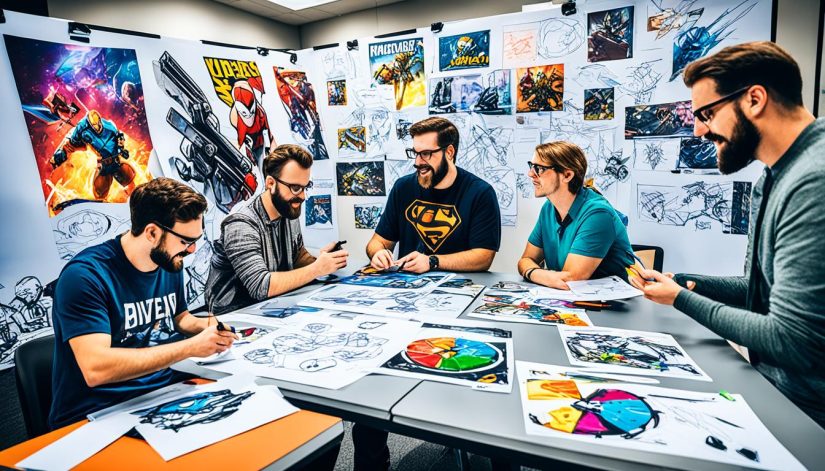Welcome to the exciting world of game development! If you’ve always dreamed of creating immersive and engaging video games, then you’ve come to the right place. In this section, we’ll be your guides as we explore the journey of starting a game studio and turning your game development dreams into a reality.
From understanding the intricacies of the game development process to establishing a strong foothold in the competitive video game industry, we’ll provide you with valuable insights and tips every step of the way. Whether you’re an aspiring game designer, programmer, artist, or entrepreneur, this section is filled with knowledge and inspiration to help you bring your creative vision to life.
Starting a game studio is no small feat, but with the right guidance and determination, it can be an incredibly rewarding endeavor. We’ll delve into the game development process, breaking it down into its different stages, exploring the roles of key team members, and unlocking the secret to crafting captivating games.
Once you have a solid grasp of the development process, we’ll help you navigate the challenges of establishing your game studio. From creating a comprehensive business plan to securing funding and assembling a talented team, we’ll equip you with the tools you need to set a strong foundation for your success.
But it doesn’t stop there. The video game industry is constantly evolving, and staying competitive is crucial. We’ll touch on the importance of market analysis, keeping up with industry trends, engaging with the gaming community, and implementing effective monetization strategies. Our goal is to ensure you not only start a game studio, but also thrive in this dynamic and ever-evolving industry.
So, buckle up and get ready to embark on an incredible adventure. Starting a game studio is challenging, but with our guidance and your passion, the sky’s the limit. Let’s bring your gaming dreams to life!
Understanding the Game Development Process
In our quest to establish a successful game studio, we must familiarize ourselves with the intricate game development process. It encompasses various stages, each crucial in bringing our visionary ideas to life. From the initial spark of inspiration to the final polished product, this process involves the collaborative efforts of a skilled team that brings together game design, programming, art, and testing.
Pre-Production: Turning Ideas into Concrete Concepts
Pre-production sets the foundation for a successful game. Here, game designers brainstorm and conceptualize ideas, refining them into concrete concepts. This is where storytelling, world-building, and gameplay mechanics are fleshed out. It’s a creative stage, often involving prototypes, storyboards, and rough sketches to visualize the game’s potential.

Game design plays a pivotal role in pre-production. Designers outline levels, puzzles, characters, and mechanics, shaping the overall player experience. They strive to strike the delicate balance between challenge and enjoyment, crafting immersive gameplay that captivates and engages players.
Production: The Art of Turning Concepts into Reality
Production is where the real magic happens. Programmers, artists, and sound designers come together to transform the conceptualized ideas into a tangible gaming experience.
Game programming is the backbone of production, where programmers bring the intricate design elements to life. They create the code that allows the game to function, implementing mechanics, artificial intelligence, and ensuring seamless interaction between the player and the virtual world.
Meanwhile, game art breathes life into the game. Artists craft stunning visuals, environments, and characters, creating an immersive experience that captivates players. Their attention to detail fuels players’ imagination and strengthens the game’s visual identity.
Post-Production: Refining, Polishing, and Quality Assurance
Post-production puts the finishing touches on the game, ensuring a polished, bug-free experience. This stage involves rigorous testing, debugging, and refining the game’s mechanics, visuals, and overall performance.
Game testing is a crucial aspect of post-production. Testers meticulously play the game, identifying any flaws, bugs, or glitches that may hinder the player experience. Their valuable feedback helps the team address and rectify any issues, ensuring a robust, seamless gaming experience.
Constant iteration and refinement occur during post-production, fine-tuning the game to perfection. The objective is to deliver a memorable gaming experience that resonates with players, capturing their imaginations and leaving a lasting impression.
The game development process is complex yet exhilarating. It brings together diverse disciplines, from design and programming to art and testing, to create captivating games that entertain millions. By understanding and appreciating the intricacies of each stage, we can navigate the development process with confidence and pave the way for our game studio’s success.
Establishing Your Game Studio
Now that you have a grasp of the game development process, it’s time to establish your game studio. We’ll guide you through the essential steps to transform your passion for gaming into a successful business venture.
Crafting a Solid Business Plan
A well-defined business plan is the foundation upon which your game studio will thrive. It provides a roadmap for success and helps attract potential investors. Start by outlining your studio’s vision, mission, and goals. Conduct thorough market research to identify your target audience and competitors. Define your unique selling proposition (USP) and develop strategies to differentiate your studio in the competitive gaming landscape.
Securing Funding for Your Studio
Funding is crucial to turning your game development dreams into reality. Explore different funding options such as angel investors, venture capitalists, crowdfunding platforms, or government grants. Craft a compelling pitch deck that showcases your studio’s potential and secures the necessary financial support. Remember to present a realistic financial forecast and highlight the monetization strategies for your future game releases.
Building a Talented Team
Behind every successful game studio, there is a team of dedicated and skilled professionals. Recruiting the right talent is essential for your studio’s growth. Look for individuals who are passionate about game development and complement each other’s skills. Seek out programmers, artists, game designers, and testers who share your vision and enthusiasm for creating exceptional gaming experiences.
Effective Marketing Strategies
In today’s competitive gaming industry, effective marketing is key to standing out from the crowd. Create a strong online presence by building a professional website and engaging on social media platforms frequented by gamers. Develop a strategic marketing plan that includes content creation, search engine optimization (SEO), influencer partnerships, and community engagement. Continuously monitor and adapt your marketing strategies to stay relevant in the ever-evolving gaming landscape.

Navigating the Landscape of Game Publishing
Game publishing can be a complex and challenging process, but it’s essential for reaching a wider audience and maximizing your studio’s potential. Research and approach reputable game publishers who align with your studio’s vision and target audience. Understand the publishing agreements and negotiate favorable terms to protect your creative rights. Leverage the publisher’s resources and expertise to increase the visibility and marketing reach of your games.
By following these key steps, you’ll be well on your way to establishing a thriving game studio that creates memorable and successful gaming experiences.
| Key Steps to Establishing Your Game Studio | |
|---|---|
| Create a solid business plan | Craft a roadmap for success and attract investors. |
| Secure funding | Explore various funding options to support your studio’s growth. |
| Build a talented team | Recruit individuals passionate about game development. |
| Develop effective marketing strategies | Create a strong online presence and engage with the gaming community. |
| Navigate the game publishing landscape | Research and approach reputable game publishers to reach a wider audience. |
Navigating the Competitive Game Industry
So, you’ve entered the vibrant world of indie game development. Congratulations! Now, it’s time to make your mark in the highly competitive game industry. But how do you stand out among the sea of talented developers?
One key factor is market analysis. By studying the market trends and understanding what players are looking for, you can create games that cater to their preferences. Whether it’s identifying popular genres or uncovering untapped niches, market analysis empowers you to make informed decisions and stay ahead of the game.
Staying relevant is also crucial in the ever-evolving landscape of the game industry. By keeping a finger on the pulse of industry trends, such as emerging technologies or new gameplay mechanics, you can ensure that your games resonate with modern players. Don’t be afraid to experiment and innovate. After all, it’s the indie studios that often push the boundaries and captivate audiences with fresh experiences.
But it’s not just about creating great games; it’s also about building a community around your studio. Engaging with players, listening to their feedback, and fostering a sense of community can not only help you establish a loyal fan base but also make valuable connections within the industry. Utilize social media, game forums, and even local events to interact with gamers and industry professionals alike.
Lastly, let’s talk about monetization strategies. While creating games is a passion, sustaining your studio requires a smart business approach. From in-app purchases to subscriptions and advertising, there are various ways to generate revenue. The trick is finding the right balance between providing value to players and ensuring a sustainable income stream for your studio.
In the competitive game industry, indie game development is both an art and a business. By analyzing the market, staying relevant, engaging with the community, and implementing effective monetization strategies, you can navigate the industry with confidence. Remember, success comes to those who dare to push the boundaries and create remarkable gaming experiences.

